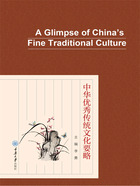
/ Non-action /
“Non-action”, as another vital concept of Lao Zis philosophy, is the guarantee of “naturalness”. Lao Zi said, “Dao acts through non-action and it always makes all things possible through non-interference with them,” by which he did not mean that one should do nothing and passively wait for something to be achieved. Neither did he deny human creativity. What he meant is that human enterprising actions must be built on the basis of naturalness, not on any attempt to interrupt the rhythm of nature. Human creativity should be in compliance with the ways of nature.
As far as government and social order, Lao Zi advocated rule through non-action. Here non-action does not mean doing nothing, but instead taking no action that is not natural, and that is against the original nature and wishes of people. It means letting people and the society take their own course without being taught and directed. In Lao Zis view, a state is badly governed when the ruler does too much. He said, “The more prohibitions there are in the world, the poorer the people will be; the more sharp weapons people have, the more turbulent the state will be; the more skills man possesses, the more strange things will appear; the more laws and orders are made, the more thieves and robbers there will be.” On the other hand, “If the ruler takes no action, the people will be transformed by themselves; if he loves tranquility, the people will become correct by themselves; if he engages in no activity, the people will become prosperous by themselves; if he has no desire, the people will become simple by themselves.” Many centuries later, there was in the West a similar political view: The best government is the one that governs least.
Taoist school of thought contrasts “action” to “non-action”. “Action” generally means that the rulers impose their will on others or the world without showing any respect for or following the intrinsic nature of things. “Non-action” is the opposite of “action”, and has three main points: through self-control containing the desire to interfere; following the nature of all things and the people; and bringing into play the initiative of all things and people. “Non-action” does not mean not doing anything, but is a wiser way of doing things. Non-action leads to the result of getting everything done.